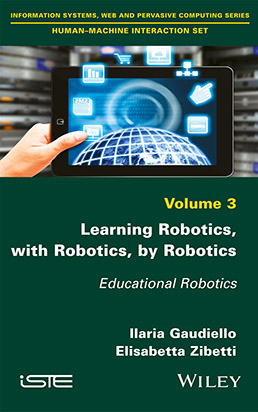
The relationship between technological and pedagogical innovation has recently created a new field of research at the crossroads between Psychology, Educational Sciences and Artificial Intelligence: Educational Robotics (ER).
Through analysis of the achievable educational goals based on the technological status and specific learning modes of different types of robots, it is possible to define three pedagogical paradigms: learning robotics, learning with robotics, and learning by robotics.
In this book we address these three paradigms through three themes: human representations of robots, the acceptance and trust shown when interacting with a humanoid, and learning favored by the development and programming of robots in an educational context. These themes allow the authors to fully explore, define and delimit this novel field of research for future application in educational and social contexts.
Finally, the book discusses contributions and limitations which have emerged from different methodologies of research, potential educational applications, and concepts of human–robot interaction for the development of the above paradigms.
1. Learning Robotics: Users’ Representation of Robots.
2. Learning with Robotics: Functional and Social Acceptance of Robots.
3. Learning by Robotics: The Impact of Educational Robots on Learning.
Ilaria Gaudiello has a doctorate in Cognitive Psychology from Paris 8 University, and since 2008 her research in French and European projects (RASPO, PRISCINET, EDHHI, etc.) has been mainly devoted to educational technologies. She is also Subject Matter Expert for LEGO Education and consultant in pedagogical innovation based on digital switchover.
Elisabetta Zibetti is Assistant Professor in Cognitive Psychology at Paris 8 University (CHART–LUTIN lab). She explores the psychological mechanisms allowing natural and artificial systems to understand, adapt to and to engage in interactions. She uses robotics as a “mindtool” to enhance the acquisition of human knowledge in theoretical and applied fields of research.